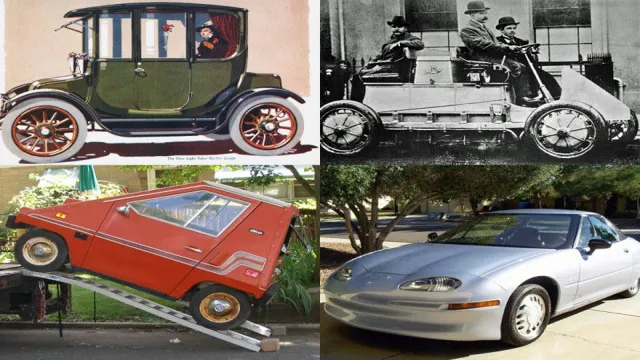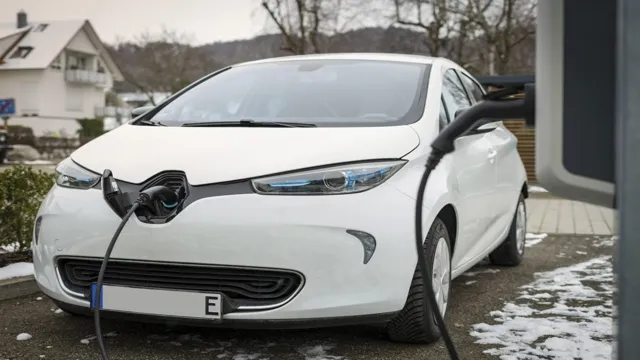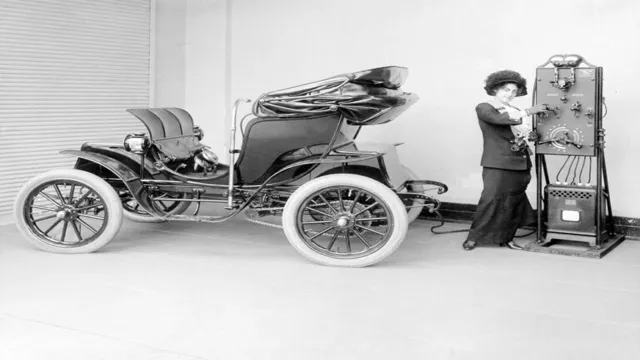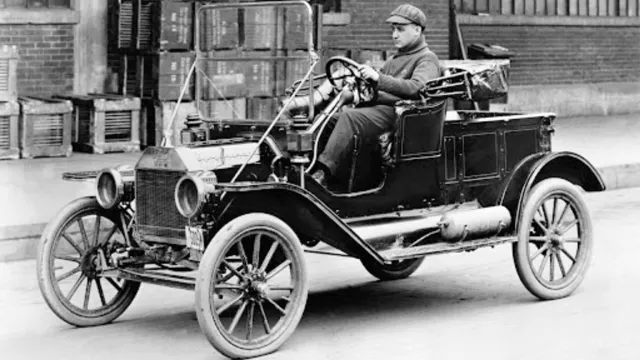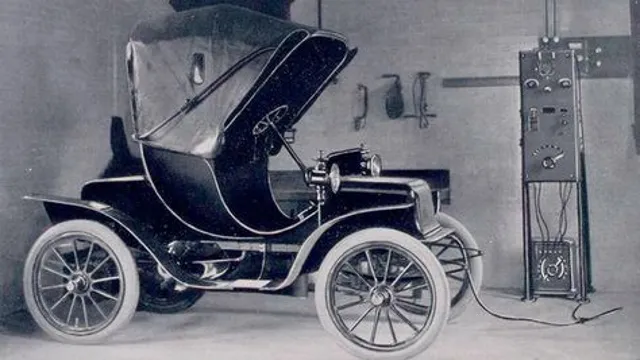The Revolution of Transportation: A Look into the Fascinating History of Gas and Electric Cars
The debate between gas and electric cars has been making rounds for quite some time now. While we currently see a rise in popularity of electric cars, there was a time when these vehicles were not even considered. The history of gas and electric cars goes as far back as the early 1800s when the first electric vehicle was invented.
In the early days, it was a tough competition between gas-powered and electric vehicles. In fact, electric cars were quite popular among the wealthy, as they were considered less noisy and more comfortable to ride. However, the invention of the internal combustion engine and the availability of cheap gasoline made gas-powered vehicles more accessible and popular.
Gas-powered vehicles then dominated the market until the 1990s when concerns about pollution and global warming sparked renewed interest in electric vehicles. With advancements in technology, electric cars became more reliable and affordable, leading us to where we are today. Despite this, gas-powered vehicles are still widely used and preferred by many, especially for long-distance travel.
Electric cars, on the other hand, are becoming increasingly popular for city commutes, given their lower operating costs and eco-friendliness. In conclusion, the history of gas and electric cars is a fascinating topic that sheds light on how the automobile industry evolved over the years. While it remains unclear which type of vehicle will eventually dominate the market, it is clear that the future of transportation is increasingly leaning towards a green and sustainable future.
Introduction to Gasoline-powered Vehicles
In the world of automobiles, gasoline-powered vehicles have a rich and fascinating history. Gasoline cars have been around for over a century, making them a staple in most households. Gasoline engines utilize a four-stroke combustion cycle that converts fuel into energy, making it an efficient and reliable source of power.
The evolution of gasoline cars has seen the introduction of numerous innovations, such as fuel injection technology and electronic ignition systems, which have made them more powerful, efficient, and eco-friendly. However, with changing times and increasing environmental concerns, the popularity of electric cars is on the rise. Electric cars have a different type of engine and rely on batteries instead of gasoline, making them an excellent alternative.
They are environmentally friendly as they produce zero emissions and require less maintenance than gasoline cars. With the advancements in technology, electric cars have gained momentum and are becoming more accessible and affordable for the everyday driver. Whether it’s a gasoline-powered car or an electric one, the options available today are more diverse and sophisticated than ever before.
Invention of Gasoline Engine
The invention of gasoline-powered engines revolutionized the automotive industry and changed how people traveled forever. Gasoline engines were a huge improvement from their predecessors, the steam engine and electric motor, as they provided the necessary power to propel cars at faster speeds for longer distances. The first gasoline-powered vehicle was invented by Karl Benz in 1885, considered the ‘Father of the Automobile.
‘ Benz’s invention was a three-wheeled vehicle able to travel up to 10 miles per hour. Although gasoline engines were initially constructed for small-scale machines, they eventually evolved into more powerful engines, powering cars, trucks, buses, and aircraft. Gasoline-powered vehicles continue to dominate the transportation industry, and advancements in technology have made them a more sustainable and ecofriendly option.
Gasoline is still a primary fuel for vehicles, and oil refineries continuously refine crude oil to provide gasoline. With the popularity of gasoline-powered cars around the world, it’s hard to imagine what transportation would be like without them, showing just how influential the invention of gasoline engines has been.
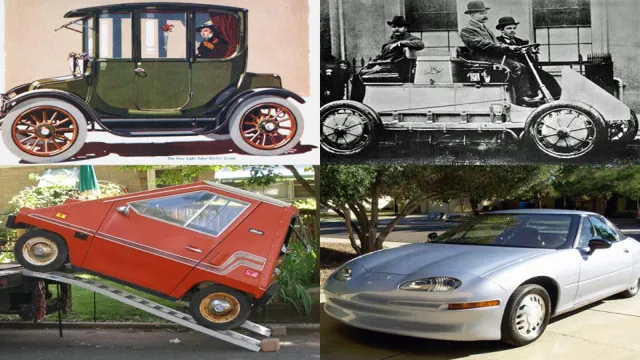
First Gasoline Cars
Gasoline-powered Vehicles Gasoline-powered vehicles revolutionized the world of transportation, offering us a new way to travel. Although electric vehicles are gaining popularity today, gasoline cars were the first to change the way we live. It all started in the late 1800s when automobile manufacturers began to experiment with different types of engines.
Combustion engines soon became the standard, running on gasoline instead of steam or electricity. The earliest gasoline vehicles were slow and clunky, but they paved the way for improved designs. Henry Ford’s Model T, introduced in 1908, made gasoline-powered vehicles affordable for the masses.
This innovation changed the world, as people could now travel further and faster than ever before. Even today, the impact of gasoline-powered vehicles on human society cannot be underestimated. With the introduction of hybrids and electric cars, gasoline vehicles will undoubtedly evolve further.
However, we can never forget that the first gasoline-powered vehicles were instrumental in changing the world.
The Rise of Electric Cars
Gasoline-powered cars have been the norm for over a century, but the recent surge in electric vehicle ownership has prompted many to wonder about the history and future of the automobile industry. Gas-powered cars have been around since the late 1800s, but it wasn’t until the early 1900s that they became the dominant mode of transportation. In 1997, Toyota released the Prius, the world’s first mass-produced hybrid car, which helped spur on the development of fully electric vehicles.
Over the past few years, electric cars have surged in popularity due to their environmental benefits and technological advancements, and they’re now becoming more affordable and widely available. As our society becomes more focused on renewable energy and sustainable living, it’s likely that electric cars will only continue to gain in popularity, potentially even supplanting traditional gas-powered cars altogether in the coming decades.
Early Electric Cars
Electric cars have been around for much longer than most people realize, dating back to the early 19th century. In fact, the first electric car was invented in 1835 by Thomas Davenport, who used a small battery to power a model car. However, the technology was still in its early stages and it wasn’t until the late 1800s that electric cars were actually put into production.
The initial appeal of electric cars was their quiet and smooth operation, as well as the fact that they didn’t produce any of the soot and smoke that gas-powered cars did. Early electric cars were also much easier to operate than gas-powered cars, with less complicated controls and no need for cranking the engine. However, the limited range of electric cars and the high cost of batteries meant that they were mostly used for short trips and by wealthy urban dwellers.
Despite these limitations, electric cars were popular in the early 1900s, with companies like Columbia Electric, Detroit Electric, and Baker Electric selling thousands of vehicles. It wasn’t until the development of the internal combustion engine and the discovery of cheap oil deposits that gas-powered cars began to dominate the market, leaving electric cars behind. But with the rise of concerns over air pollution and climate change, electric cars are once again gaining popularity, with improved battery technology and charging infrastructure making them a viable option for a growing number of drivers.
Benefits of Electric Cars
As the world shifts towards renewable energy, electric cars are rapidly gaining popularity. Unlike traditional gas cars, electric cars derive their power from rechargeable batteries, making them cleaner and more efficient. There are numerous benefits of electric cars, including reduced emissions and lower operating costs.
By relying on electricity instead of fossil fuels, electric cars produce no tailpipe emissions, making them an environmentally friendly option. In addition, since electric cars are simpler in design, they require less maintenance and have lower operating costs, making them a more cost-effective alternative in the long run. As more and more automakers introduce electric car models, the demand for these eco-friendly vehicles is expected to continue rising.
With benefits such as lower emissions and cost savings, it is no surprise that electric cars are gaining popularity as the future of transportation.
Decline of Electric Cars
The decline of electric cars has been a hot topic in recent years as people become more aware of the impact of their transportation choices on the environment. However, it’s essential to recognize that the rise of electric cars is still very much happening. More and more car manufacturers are investing in electric vehicles as they work towards reducing their carbon footprint.
Furthermore, many governments around the world are introducing initiatives to promote the use of electric cars, such as tax incentives and the establishment of charging stations. With advancements in technology, electric cars are becoming more affordable and offering longer ranges. In short, the decline of electric cars is merely a bump in the road, and the rise of electric cars is set to continue.
As individuals, we can also play a role in the growth of electric cars by considering them as a viable option when choosing our next vehicle.
Modern Gas Vs. Electric Cars
The history of gas and electric cars is a fascinating one, as both technologies have gone through their ups and downs. In the early years of the automotive industry, electric cars were actually more popular than gas cars due to their ease of use and low maintenance costs. However, as gas engines became more efficient and accessible, they quickly became the dominant force in the market.
It wasn’t until the 21st century that electric cars began making a serious comeback, driven in part by concerns over environmental sustainability and rising fuel prices. Today, both gas and electric cars have their pros and cons depending on your needs. Gas cars offer longer ranges and faster acceleration, while electric cars are cheaper to fuel and have a lower environmental impact.
It’s up to each individual driver to decide which option works best for them, whether they prioritize power and convenience or sustainability and affordability.
Environmental Impact
When it comes to environmental impact, choosing between gas and electric cars can be a complicated decision. While gas-powered vehicles emit harmful pollutants and contribute to climate change, electric cars rely on electricity which can still be generated through non-renewable means. However, electric cars have many advantages that make them a better choice for the environment.
For one, they emit significantly less CO2 and other harmful pollutants compared to their gas counterparts. Additionally, electric cars can be powered by renewable energy sources like solar or wind power, making them an even greener option. Switching to an electric car can have a significant impact on reducing your carbon footprint and working towards a more sustainable future.
So if you’re looking to make a difference, consider making the switch to an electric vehicle.
Technology Advancements
When it comes to choosing between modern gas and electric cars, the decision can be difficult. Gas cars have been around for over a century, but electric cars are gaining in popularity due to their environmentally-friendly nature. Gas cars are still faster and have a longer range, but electric cars are catching up with advancements in battery technology.
Additionally, electric cars have lower fuel costs and require less maintenance, making them a more cost-effective option in the long run. Ultimately, the choice between gas and electric cars depends on personal preferences and priorities. While both have their advantages and disadvantages, the shift towards electric cars is becoming more apparent as technology continues to improve.
Conclusion
As we look back on the history of gas and electric cars, it becomes clear that the battle between these two types of vehicles has been raging for over a century. From the early days of electric cars dominating the roads to the rise of gas-powered vehicles in the 20th century, each technology has had its time in the spotlight. But in recent years, a new contender has emerged in the form of hybrid and electric vehicles that offer the best of both worlds.
With improved battery technology and charging infrastructure, these vehicles are slowly but surely gaining ground on gas-powered cars. So, where does the future lie? Will we see an all-electric world or a continued coexistence with gas-powered vehicles? Only time will tell, but one thing is for certain: the history of cars is far from over, and we are all along for the ride. So buckle up, charge your battery, and get ready for whatever the road ahead may bring.
FAQs
What is the history of gas-powered cars?
Gas-powered cars were first introduced in 1885 by German engineer Karl Benz.
When were electric cars first produced?
Electric cars were first produced in the early 1800s, but they didn’t become popular until the late 1900s.
What are the environmental benefits of electric cars compared to gas-powered cars?
Electric cars produce zero emissions, while gas-powered cars emit harmful pollutants into the atmosphere.
How does the cost of owning and operating a gas car compare to an electric car?
The cost of owning and operating an electric car is typically lower than a gas-powered car due to lower fuel costs and maintenance expenses.
Why have gas-powered cars remained so popular despite the rise of electric cars?
Gas-powered cars have a well-established infrastructure and are more convenient for long-distance travel compared to electric cars.
